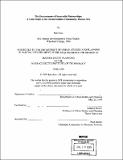| dc.contributor.advisor | Langley Keyes. | en_US |
| dc.contributor.author | Soto, Inés, 1974- | en_US |
| dc.contributor.other | Massachusetts Institute of Technology. Dept. of Urban Studies and Planning. | en_US |
| dc.coverage.spatial | n-us-ma | en_US |
| dc.date.accessioned | 2012-04-26T18:39:45Z | |
| dc.date.available | 2012-04-26T18:39:45Z | |
| dc.date.copyright | 1999 | en_US |
| dc.date.issued | 1999 | en_US |
| dc.identifier.uri | http://hdl.handle.net/1721.1/70318 | |
| dc.description | Thesis (M.C.P.)--Massachusetts Institute of Technology, Dept. of Urban Studies and Planning, 1999. | en_US |
| dc.description | Includes bibliographical references (leaves 44-45). | en_US |
| dc.description.abstract | This case study analyzes the partnership of three non-profit agencies, Boston- Aging Concern-Young and Old United, The Women's Institute of Economic Development and the Boston, YWCA, who collaborated in a pilot project called the GrandFamilies House. The result was the first housing development in the country for grandparents raising their grandchildren. This case study is based on 8 interviews with key actors conducted between January and March 1999, a survey of 24 of the 26 residents conducted between March and May 1999, independent research, and participant observation as I interned in the project from January 1998 through May 1999. In understanding the partnership, this case study analyzes the important elements needed when trying to serve this relatively new population. There are three components to this analysis; (1) a description of the target population;(2) a summation of the initial survey that was used to develop the GrandFamilies concept;(3) and a the follow-up survey, which was used to explore how theories of service and housing actually went into operation. Findings from the study suggest that GrandFamilies comprise a rather heterogeneous population. Their needs vary according to age and household or family situations. Taking into consideration those within-group differences is essential if we are to design more effective programs to serve them. | en_US |
| dc.description.statementofresponsibility | by Inés Soto. | en_US |
| dc.format.extent | 45 leaves | en_US |
| dc.language.iso | eng | en_US |
| dc.publisher | Massachusetts Institute of Technology | en_US |
| dc.rights | M.I.T. theses are protected by
copyright. They may be viewed from this source for any purpose, but
reproduction or distribution in any format is prohibited without written
permission. See provided URL for inquiries about permission. | en_US |
| dc.rights.uri | http://dspace.mit.edu/handle/1721.1/7582 | en_US |
| dc.subject | Urban Studies and Planning. | en_US |
| dc.title | The determinants of successful partnerships : a case study of the GrandFamilies community, Boston MA | en_US |
| dc.type | Thesis | en_US |
| dc.description.degree | M.C.P. | en_US |
| dc.contributor.department | Massachusetts Institute of Technology. Department of Urban Studies and Planning | |
| dc.identifier.oclc | 44051445 | en_US |
